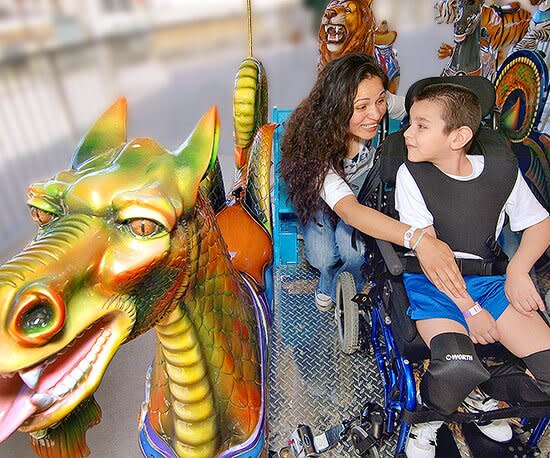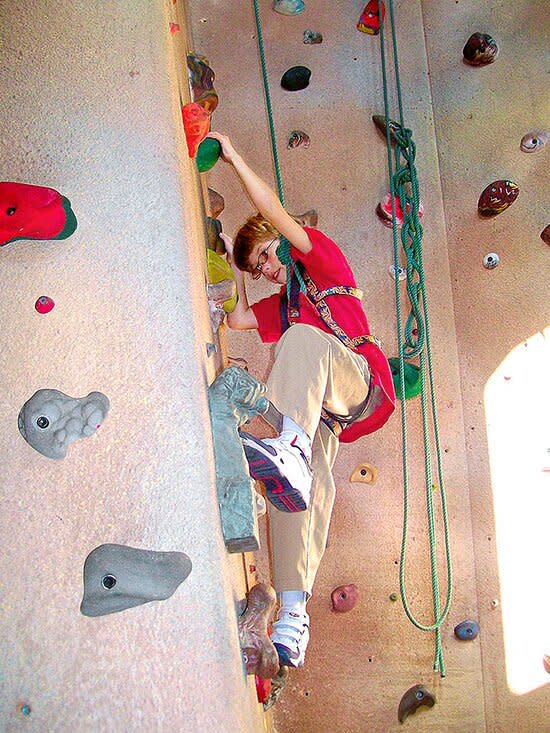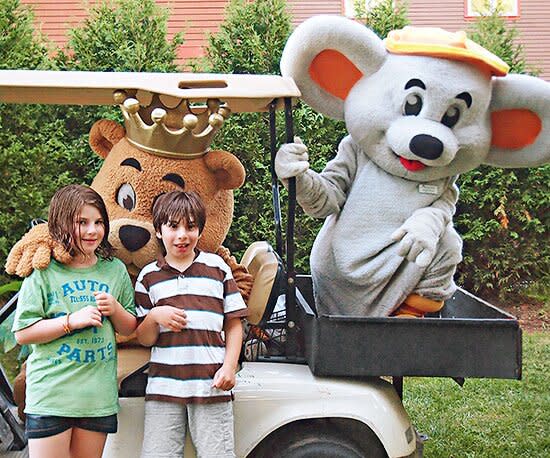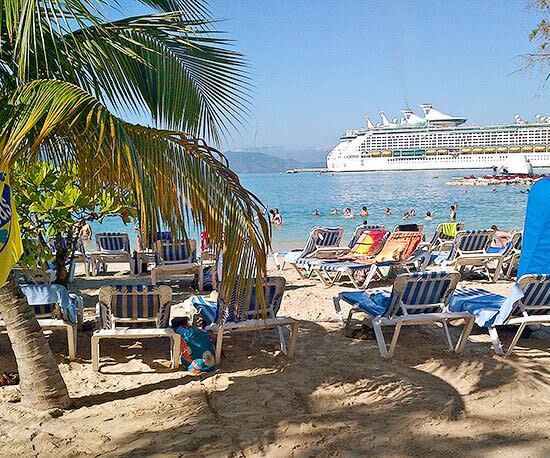Vacations Great for Special-Needs Kids

Courtesy of RC French Photography
Morgan's Wonderland
San Antonio, Texas
The nation's premier special-needs theme park, Morgan's Wonderland opened four years ago based on the vision of philanthropist Gordon Hartman. "I was at a hotel pool with my daughter, Morgan, who was 11 or 12 at the time, when she kept looking over at two other kids in the pool who were tossing around a ball," he recalls. "I knew she wanted to play with them, but because she has special needs she didn't have the communication skills to ask, so she hit the ball. They grabbed it from her and got out of the water." That's the moment the retired homebuilder decided that he wanted to create a place where kids with special needs and those without could have fun together. He traveled around the country, seeking input from pediatricians, families, therapists, and engineers. The result: a 25-acre oasis on the city's northeast side, where every ride and attraction -- from the carousel to the train to the off-road adventure -- can accommodate all children and adults.
Morgan's Wonderland has attracted families from around the world, but it also has a loyal following of locals whose kids don't have special needs. "I love that the park brings everyone together," says San Antonio mom Laurie Dillingham, whose 7-year-old daughter, Bella, is unable to move purposefully due to porencephaly, a rare condition in which the brain doesn't develop properly. "We meet Bella's friends there -- some have special needs and some don't, but all of us have a great time." Bella and her friends like to explore The Sensory Village (with a pretend supermarket and other storefronts plus a weather station), shows that often highlight special-needs performers, and swings that connect to her wheelchair. The atmosphere is relaxed. "If your child wants to go on the ride more than once, you don't have to get out and wait in line again, she says. "When Bella was born, the doctors told us that she would never laugh or smile. I wish they could see her riding on those swings over and over."
($15 for 11 and up, $10 for kids ages 3 to 10, free for special-needs visitors and those ages 2 and under; morganswonderland.com)
Smugglers' Notch
Jeffersonville, Vermont
Although it's known for its skiing, this resort area offers amazing summertime adaptive programs for kids ages 3 and up. Depending on the need, children may be given a trained camp counselor and can be incorporated into the kids' program to swim, hike, climb the rock wall, and do arts and crafts, or be part of a special-needs group. If they're 6 or older, they can take part in an Autism Mountain Camp that includes horseback riding and sailing. Private swim lessons, which focus on fulfilling a child's sensory needs, are also available.
"The level of accommodation and attention in the special-needs program is outstanding -- but Max also enjoyed participating in the resort's many other activities," says Parents blogger Ellen Seidman; her son Max, 11, has cerebral palsy. "He really got a kick out of I-Did-A-Cart, where kids build and paint their own go-cart then watch it fly off a ramp. Actually, I loved that too!"
In the winter, the resort offers adaptive skiing and snowboarding, stocking equipment such as a biski, which allows kids to ski in a sitting position. "My 13-year-old son, Tate, who has autism, can't get enough of this place. We've been coming here for six years. It's where he learned to ski, sail, and hike," says Paul Horton, of Southport, Connecticut. And Horton's 5-year-old twins, who don't have special needs, are enamored with Smugglers' Notch too. "Tate goes to the camp all day and the twins stay half a day so my wife and I have time to take a hike a together, like we did before the kids were born," he says.
(In summer, a four-night stay in a two-bedroom condo with a kitchen starts at $1,316; summertime adaptive programs start at $145 per day, $80 per half-day; smuggs.com)

Courtesy of the National Ability Center
National Ability Center and Autism on the Seas
National Ability Center
Park City, Utah
This winter-sports hub is home to the National Ability Center, a nonprofit organization that offers year-round camps and programs for children with all kinds of special needs. "We've been coming here since my boys were 4 -- and now they're 15," says Lisa Pathman, of San Diego, whose children, Shane and Riley, both have cerebral palsy. "They started out just taking part in the adaptive ski programs, but then grew to love canoeing, horseback riding, and rafting. Riley used to be in a wheelchair, but he's been able to get around with a walker in part due to the strength and confidence he gained doing these programs."
Each summer, the center offers weeklong Discovery Camps for kids ages 6 and up as well as family camps that your whole clan can participate in together.
(Family camps cost about $350 per person, including meals and lodging; individual camps, without lodging or meals, start at $170. Scholarships are available; discovernac.org)
Autism on the Seas
Various Locations
This travel agency works with four cruise lines (Royal Caribbean, Disney, Carnival, and Celebrity) to make your time on board smooth sailing. During certain cruises, you can be part of a group with other special-needs families (not limited to autism) that gets faster check-ins, reserved seating for shows, special meet-and-greets with characters, and early private access to attractions that might have a wait, like waterslides.
"Trained staff watch all your kids -- whether they have special needs or not -- in the children's club or in a private room for about three hours daily so you're free to have some 'me time,'" says Brittney Rivers, who has 7-year-old twins, one of whom has autism. "Both kids loved the trip, but I got so emotional when we were at the port prior to boarding our Disney cruise and my son with autism, who is nonverbal, excitedly said, 'Boat, boat!' when he saw the cruise ship."
The agency works with cruise employees to make sure dietary needs and room requests (like a door alarm for children who are prone to wander) are taken care of too. The costs for these extra services: about $100 more per person in addition to the regular cruise fare.
(Four- to seven-night options are available from various ports; alumnicruises.org/Autism)

Courtesy of Ellen Seidman
Theme-Park Pointers
Planning a trip to an amusement park? Contact guest relations beforehand to see how they'll be able to accommodate your child's needs. Many theme parks give families a card or pass that allows them to get in an express-type line immediately or gives them a return time to come back if the wait exceeds a certain number of minutes. Theme parks vary in whether they allow your family to obtain a return time for another ride if you haven't used the first one yet and the maximum number of people covered by the pass, says Maureen Deal, owner of AutismAtTheParks.com. Here's what to expect:
Disney Parks
What to Ask For: Disability Access Service Card
Given a Return Time if the Wait Exceeds: 10 minutes
Permission to Collect Multiple Return Times: No, but you can also use the FastPass system
Maximum Number of People in Your Party: Varies; contact guest relations
Seaworld Parks (including Busch Gardens and Sesame Place)
What to Ask For: Ride Accessibility Program
Given a Return Time if the Wait Exceeds: Varies
Permission to Collect Multiple Return Times: Yes
Maximum Number of People in Your Party: 6
Cedar Fair Parks
What to Ask For: Guest Assistance Card
Given a Return Time if the Wait Exceeds: 20 minutes; 10 minutes for Knott's Berry Farm
Permission to Collect Multiple Return Times: No
Maximum Number of People in Your Party: 4
Legoland California
What to Ask For: Assisted Access Pass
Given a Return Time if the Wait Exceeds: Access is always immediate
Permission to Collect Multiple Return Times: N/A
Maximum Number of People in Your Party: 6
Universal Orlando
What to Ask For: Attraction Assistance Pass; options might be offered
Given a Return Time if the Wait Exceeds: 30 minutes
Permission to Collect Multiple Return Times: No
Maximum Number of People in Your Party: 6
Planning Tips for Any Trip
No matter where you're headed, preparation is the key to reducing stress, says Karin Sheets, founder of the Special Needs Travel Mom blog. Check these to-dos off your list before you leave home.

Courtesy of Autism on the Seas and Royal Caribbean International
ON THE PLANE
- Consider rehearsing first. If your child with special needs has never flown, you might want see if your local airport offers "practice events" that allow families to go through security, board the plane, and run through pre-takeoff procedures so kids will better understand what to expect. Autism Speaks recently partnered with JetBlue for an event at JFK airport in New York City; check autismspeaks.org for future events and a guide to air travel. Wings for Autism is also planning events at airports across the country. If you can't make it to one of these sessions, talk to your child about what to expect.
- Call the carrier directly. "Checking off the special service box when booking online isn't enough," says Sheets, whose 14-year-old daughter requires a wheelchair. "Follow up with a phone call to ask any questions. At the ticketing counter the airline will direct you to special services, and oftentimes someone will help you through security and to the gate."
- Think about distractions. Pack a combination of favorite toys and games along with a few new items that you think will hold your child's attention, suggests Sharlene Earnshaw, editor-in-chief of the family-travel website Trekaroo and mom of a 7-year-old son with autism. Thanks to a recent change in government regulations, most airlines now allow anyone to use portable electronic devices for the entire flight as long as they're on airplane mode. "I usually download a few new apps before our trips," she says.
- Be patient. "One thing I've learned is that flying with my special-needs child gets easier with every trip; we have the routine down to a science. My special-needs daughter actually laughs when the engines rev up because she knows we are going someplace fun. But that's not how our first trip went, so take heart -- the more you travel, the better you all get at it and the more fun you are able to have," says Sheets.
IN THE CAR
- Show progress. Special-needs or not, all kids want to know, "Are we there yet?" Gillian Marchenko is the author of Sun Shine Down: A Memoir. She has two 7-year-old daughters with Down Syndrome and suggests hanging a string across the backseat of the car, and moving a clip or clothespin to help kids understand how far they've traveled and how much farther they have to go.
- Sprawl out for lunch. Don't cram everyone into a table at a rest stop or fast-food restaurant. For day trips, pack a cooler. "When we're on the road for a few days, we buy lunch and GPS to the nearest park so the kids can let off steam before getting back in the car," says Meredith Cornish, of Titusville, Florida, mom of nine children including six who have special needs.
AT THE HOTEL
- Think modern. The law requires that all hotels constructed in 1993 and beyond conform to disability standards (like having a certain number of rooms with roll-in showers) while hotel pools built or altered after 2013 are required to have one or two means of entry and exit, such as a lift, for disabled people.
- Book a suite. Look for chains like Residence Inn, Embassy Suites, or Hyatt Houses that offer a living area and bedroom. "On our first trip, my daughter -- who was 7 or 8 at the time -- was so overwhelmed that she wanted to stay in the room and wanted no one to talk," says Sheets. "If we had more space, we would have been able to give her the quiet she needed and enjoy ourselves more."
- Makes specific requests. About a week prior to your arrival, check in with the hotel and ask for everything you need -- whether it's a mini fridge to store medicine, a bench in the shower for accessibility, plastic cups instead of glass because of a safety issues, or a room on the first floor. Then remind them at check-in.
This piece was accurate at publication time, but all prices, offerings and availabilities are subject to change. Please contact each hotel and attraction for up-to-date rates and information before taking your trip.
Originally published in April 2014 issue of Parents magazine
